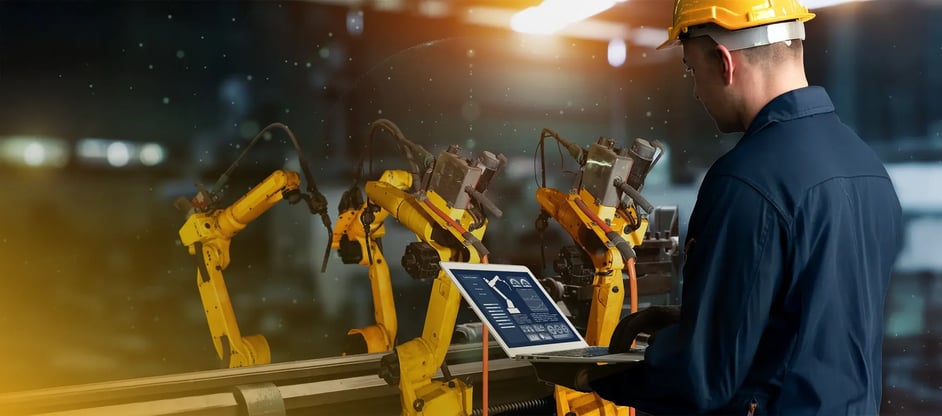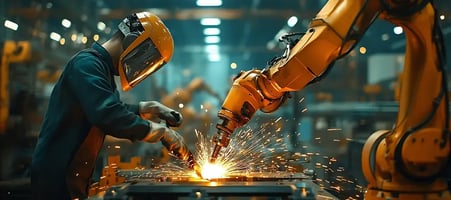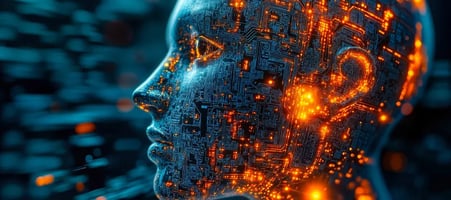From gears to algorithms: How AI is powering Industry 4.0

Have you ever checked out Megafactories on NatGeo? It’s an incredible series that takes you inside some of the world’s most advanced manufacturing plants, showing how cutting-edge technology, automation, and engineering come together to build everything from supercars and aircraft to luxury watches and everyday products. All in all, the show defines the future of manufacturing and the role of AI.
From steam engines to mass production and automation, industries have come a long way. Today, AI is at the forefront of Industry 4.0, revolutionizing everything from supply chain management to predictive maintenance. So, what is Industry 4.0? Often referred to as the fourth industrial revolution, it is transforming the way businesses operate by integrating advanced digital technologies into manufacturing and industrial processes.
Is AI driving this next big leap? You bet!
Building on some past research; the Forrester report: The State of AI in engineering (2023) highlights AI’s growing role in engineering to enhance efficiency and competitiveness. 82% of leaders cite financial risks from product launch delays, while 55% find existing virtual validation tools not effective. With 67% feeling pressured to adopt AI, and 65% are expanding AI implementation efforts and even evaluating vendors.
Holistically, the report underscores AI’s role in streamlining workflows, reducing risks, and accelerating innovation in engineering. It is based on Forrester Consulting's study of 163 engineering leaders, assessing their challenges and priorities during the validation and verification phase and how AI can address them.
In addition, the Everest report, ‘Agentic AI: Revolutionizing the Future of Automation’, highlights how the manufacturing sector is leveraging Agentic AI to enhance efficiency, reduce costs, and automate key processes like assembly, warehouse management, product simulation, and quality inspection.
How can AI shift gears for Industry 4.0?
AI is at the core of Industry 4.0, transforming the way businesses operate by making automation smarter and decision-making more data-driven. It can analyze massive amounts of data in real time, optimize production processes, and even predict potential failures before they happen, reducing downtime and improving efficiency.
When combined with IoT, cloud computing, and big data analytics, AI enables businesses to achieve greater operational efficiency, cost savings, and innovation. From predictive maintenance in factories to smarter supply chains, AI is helping industries stay competent and relevant.
What’s smart manufacturing got to do with AI?
Tesla’s Gigafactories are a glimpse into the future of manufacturing, where AI-driven automation powers everything from battery production to vehicle assembly. With AI-powered robots handling the heavy lifting, Tesla streamlines manufacturing, cuts down errors, and maximizes efficiency—establishing its place as one of the most advanced production hubs in the world.
Now, that’s smart manufacturing!
AI is revolutionizing smart manufacturing in Industry 4.0. AI-powered robots and autonomous systems handle complex tasks with minimal human input, reducing errors and boosting productivity. These systems adjust in real time using sensor data, ensuring precision and efficiency. Machine learning further optimizes workflows, cuts downtime, and improves product quality through continuous learning.
Did you say Predictive maintenance?
Predictive maintenance uses AI and real-time data to spot potential equipment failures before they happen. Instead of waiting for a breakdown or following a fixed schedule, businesses can fix issues early, reducing downtime, costs, and repairs. It’s a game-changer for industries like manufacturing, aviation, and energy, keeping operations smooth and efficient.
For instance, General Electric (GE) leverages AI-driven predictive maintenance in its aviation and energy divisions. AI-powered analytics help monitor turbines, engines, and industrial equipment, reducing failures and enhancing operational efficiency.
Not loosing the ‘human’ within automation
Siemens leverages augmented reality (AR) to enhance industrial operations by providing technicians with hands-free access to vital information, leading to improved troubleshooting, training, quality, safety, and productivity.
Contrary to popular concerns, AI isn’t here to replace jobs—it’s here to enhance human capabilities. In Industry 4.0, AI handles repetitive tasks, allowing workers to focus on problem-solving, innovation, and strategy. Plus, AI-driven AR and VR are transforming training and operations, making them more effective with augmented efficiency.
No guts, no glory.
AI is shaping up Industry 4.0, but it’s not without challenges. Cybersecurity risks, data privacy concerns, and a shortage of skilled AI professionals make adoption tricky. Plus, integrating AI with older systems takes careful planning and investment.
That said, AI’s role in industries is only going to expand. The future will bring strong collaboration between humans and smart machines, making industries more efficient and resilient. Companies that embrace AI early will stay ahead, driving innovation and long-term growth in the digital cosmos.
So, are you still waiting around to step on to AI-powered fast gear for your business? We got you covered.


